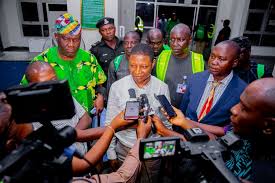— Journalist meets with Shekau in Borno forest
— We know where the girls are kept, military says
By Samuel Aruwa, Kaduna,
and Jibrin Baba Ndache,
The federal government has scuttled a chance to rescue the over 200 schoolgirls being held by Boko Haram, it emerged yesterday.
A report in the United Kingdom’s Mail On Sunday newspaper, quoting Nigerian security sources, said the kidnapped schoolgirls came agonisingly close to freedom before government officials called off a deal to swap them for the Islamist sect’s jailed members.
The weekly also revealed that a former correspondent of Blueprint in Borno state, Ahmed Salkida, who was “trusted by both the government and extremists from Boko Haram,” acted as go-between, “risking his life on a one-man mission to enter the gunmen’s lair and broker an agreement.”
At the 11th hour on Saturday, May 17, federal government officials scrapped the exchange in a telephone call from a crisis summit in Paris where President Goodluck Jonathan met foreign ministers including those from Britain, the United States, France and Israel.
According to the sources, it was agreed there that no deals should be struck with terrorists and that force should instead be used against them.
The U-turn is said to have enraged Boko Haram leader Abubakar Shekau, the newspaper said, adding: “Insiders believe that the cancellation of last Saturday’s plan and the ensuing stand-off now puts the girls’ lives in even greater danger.”
An intelligence source told The Mail on Sunday: “The next video we see from the terrorists could show the girls being killed one by one.”
Sources in Abuja described how Shekau had agreed to bring the girls out of their forest camps in the remote north-east of the country in the early morning and take them to a safe location for the prisoner swap.
“They would have been dropped off in a village, one group at a time, and left there while their kidnappers disappeared. There was to be a signal to a mediator at another location to bring in the prisoners,” sources said.
About 2,000 Boko Haram members are currently detained, the source said.
According to the source, 100 non-combatant, low-level Boko Haram sympathisers were to be freed and the two groups brought together in a convoy of buses accompanied by Salkida, the “hand-picked go-between.”
The plan had been agreed in tortuous negotiations in response to worldwide outrage over the night-time raid on a school in Chibok town on April 14 when the girls were abducted from their dormitories.
Salkida was born in Borno state, where Boko Haram originated. He has known its leaders all his life and has unprecedented access.
He has been arrested on several occasions accused of being a Boko Haram sympathiser, and he fled with his family to Dubai two years ago.
But two weeks ago, he was summoned out of exile by Jonathan’s aides.
He initially feared he might face arrest, but was then given a letter of indemnity signed by the president when he flew to Nigeria.
Sources said Salkida was able to travel by taxi to the group’s forest camp to talk to Shekau two weeks ago.
“His mission was secretive and dangerous,” they said.
“He is probably the only civilian with access to Shekau. There is trust between them and Salkida had only one aim – to get the schoolgirls out.
“He reported afterwards that the group of girls he saw were alive and well, and being adequately fed and sheltered. They told him all they wanted was to go home.”
Salkida’s mission was complicated by the chaos surrounding the Nigerian government’s pronouncements about negotiations with the terrorist group.
Shekau has released two shocking videos showing the girls dressed in hijabs and reciting verses from the Koran.
His movement is violently opposed to Westernisation.
Wearing combat fatigues and brandishing an AK-47 rifle, he has demanded the release of his members from prisons.
The newspaper quoted the Special Adviser to the President on Media, Dr Reuben Abati, saying on Saturday: “I am not aware of an attempted rescue plan taking place last week.”
Meanwhile, the Chief of Defence Staff, Air Marshal Alex Badeh, yesterday said the security leadership in the country has located where members of Boko Haram are holding the abducted Chibok girls.
Badeh also said the military would not use force to release the girls because of the need to prevent the insurgents from killing them.
Speaking while receiving a solidarity rally organised by the Citizens Initiative for Security Awareness, led by its National Coordinator, Mr. Chidi Omeze, outside the Defence Headquarters in Abuja, the CDS said the military had the capacity to bring back the abducted girls but would not use force to do that.
He noted that the military knew what it was doing and should be allowed to continue with its work, adding that the military would not go and get the girls killed in the attempt to bring them back.
“We want our girls back; we want our girls back; we can do it. Our military can do it, but where they are held, can we go with force?
“If we go with force, what will happen? So nobody should come and say the Nigerian military does not know what it is doing. We know what we are doing. We can’t go and kill our girls in the name of trying to get them back. So we are working.
“The good news for the girls is that we know where they are but we cannot tell you, we cannot come and tell you military secrets here. Just leave us alone. We are working, we would get the girls back.”



